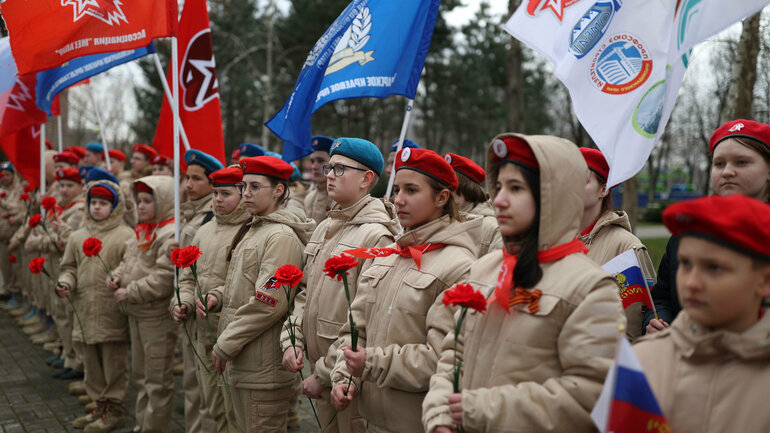Russian State Patriotism and Putinʼs Invasion of Ukraine

During Russian president Vladimir Putinʼs 22-year reign, an eclectic combination of historical periods has been woven into a narrative that seeks to articulate the countryʼs greatness. This approach to history has become the Russian stateʼs way of compensating for the post-Soviet ideological vacuum. In this effort, a top priority has been the patriotic education of Russiaʼs youth. Over the years, observers have witnessed the rise and fall of pro-Putin patriotic youth movements, widespread support for Putin among young people, but also obvious generational dividing lines between Soviet-era and Putin-era age groups.
Amid the shockwaves caused by Russiaʼs invasion of Ukraine, it is worth assessing the possible effects of patriotic politics and education on young Russians. State propaganda in Russia is drumming up an ideological war against the West in which, in Putin’s words, all critics are national traitors. Against this backdrop, what can be expected from the possible mobilisation of Russia’s youth?
Conformism without commitment
In Soviet times, the central elements of patriotism were the ideals of good behaviour and citizenship, on the one hand, and readiness to defend the homeland, on the other. Except for any references to communist ideology, these elements were inherited by Putin-era patriotic programmes. These programmes sought to break free from the degradation of the 1990s and the wrongs of Western values. But without a proper tradition of citizenship education, patriotic programmes have had to balance so-called soft patriotism, which emphasises universal virtues of good citizenship, with the Soviet tradition of military patriotic education. As tensions with the West have grown, especially since 2014, military patriotism has become increasingly prominent in Russia’s patriotic education.
State patriotism in Russia is a component of institutions designed to produce compliance and cooperation within monopolies of political power. Russiaʼs youth, like the rest of the population, has confidence in the country’s central state institutions, in particular the president and the military. In a similar vein, many young Russians see patriotism as a good thing and largely subscribe to official historical narratives.
At first glance, therefore, the patriotic education of young people has succeeded in its ideological goal of producing a broad endorsement of state policies. However, at the same time, young people have emerged as the age group most critical of the Russian regime. Widespread conformism is not the same thing as unanimous loyalty to the regime, especially when the principles of patriotism do not align with individual preferences. These include, for example, access to social media, travelling abroad and freedom of expression. In short, Russians perceive patriotism as a mixture of apolitical conformism and individualism. Among the youth, this is seen most clearly as a more positive attitude towards the West or a more critical attitude towards state media compared with the rest of the population.
Patriotism without militarism
It is difficult to assess how the propaganda, intimidation, and repression of critics that have already resulted from Putin’s invasion of Ukraine will shape citizens’ attitudes in the future. The time for soft patriotism is over, and the demands of increasingly militant patriotism are penetrating society. However, what is clear is that Putin has taken away the futures of many young Russians by cutting ties with the West, since young Russians are particularly integrated into the West by means of various influences.
Putinʼs vision of a stable Russia independent of the West, set against the humiliation of the 1990s, does not resonate with older age groups, either. Our research shows that the Soviet-era patriotic upbringing of educated urban Russians born in the early 1980s did not lead to a political connection with Putin-era patriotic ideals. Aside from conforming to patriotic views of the Russian state, survey respondents had emphatically negative attitudes towards military patriotism. In popular perceptions of patriotism, it is the military dimension that is most often criticised. In particular, militaristic policies appeal less to younger cohorts.
The Russian army is respected above all on a symbolic level, while the readiness of young men for military service has been low; Russians will avoid military service if opportunities allow. Consequently, as the country becomes impoverished and closed off from the outside world, deeper apathy and, for some, emigration are more likely than a large-scale mobilisation in support of the invasion of Ukraine.
Jussi Lassila is a senior research fellow at the Finnish Institute of International Affairs.